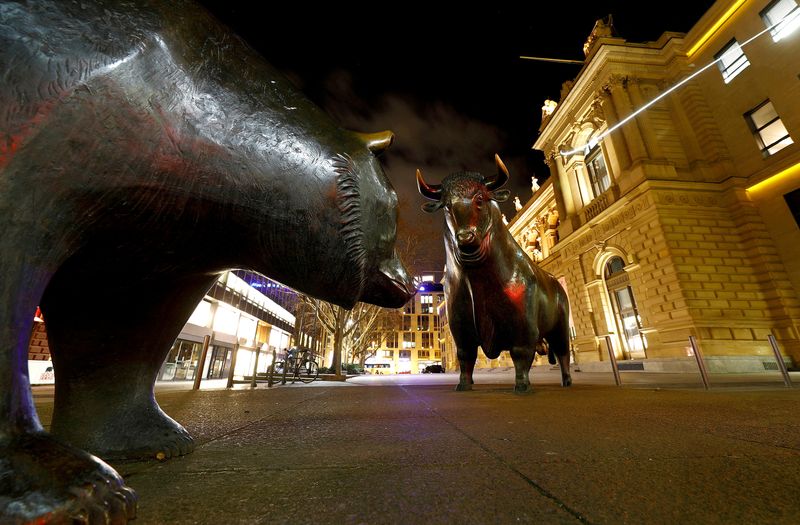By Danilo Masoni and Samuel Indyk
MILAN/LONDON (Reuters) - European exchange stocks stand to benefit from a spike in volatility surrounding the downfall of Credit Suisse, as some investors turn towards bourse operators attracted by their defensive qualities and modest valuations.
The exchanges' share price performance has lagged the region-wide STOXX 600 index by up to 13 percentage points since September, as investors chased banks, potentially a more attractive trade because of rising interest rates.
But after a quiet start to the year for trading activity, the turbulence in March is spurring some investors to shift their exposure as part of a wider shift away from banking into other sectors.
Spikes in bond and equity volatility could yield positive earning surprises for exchange companies during the upcoming reporting season, just when tightening credit conditions risk hitting economic growth, making defensive businesses like exchanges more attractive.
Exchange operators' shares have outperformed in the past few weeks, with traders and analysts pointing to signs of investors rotating into exchanges, partly at the expense of banks. Volume spikes tend to boost activity across trades processed by exchange operators.
"There's rotation, the most obvious and public example of this is in the price action," said Andrew Morgan, president at U.S.-based financial technology provider TS Imagine.
"Exchange operators are data and technology businesses with defensive utility-like features, while banks are highly cyclical and exposed to idiosyncratic business model risks".
Equity trades across Euronext, which runs exchanges in seven big European centres from Paris to Amsterdam and Milan, reached the third-highest value in the company's history on March 17. Its average daily traded volumes in March were the highest in a year.
Swiss exchange SIX, at the epicentre of the turmoil around UBS's rescue of Credit Suisse, had a 44.6% jump in March turnover compared with February. Cash market turnover at Deutsche Boerse (ETR:DB1Gn) rose 23.7% last month versus February.
Average daily value traded at the London Stock Exchange (LSEG) rose 12.9% month-over-month in March. Thomson Reuters (NYSE:TRI), which owns Reuters News, has been a shareholder in LSEG since 2021. LSEG also pays Reuters for news.
(Graphic: Exchanges 1 - https://fingfx.thomsonreuters.com/gfx/mkt/egpbylogdvq/Exchange%20operators%201.PNG)
VOLATILITY BOOST
Evidence of any shift could be revealed when filings disclosing how mutual funds have tweaked their positions are published in a few weeks' time.
UBS research that uses the bank's prime brokerage data and other sources showed in April that investor "crowding" in exchange operators' stocks has been recovering from four-year lows.
Among financials in Europe, exchange stocks are the most positively correlated to volatility.
Banking turmoil and option expiries drove the Euro STOXX volatility index last month to its highest since October in a steep surge that quickly pared back. The MOVE index, a gauge of fixed-income volatility, hit 2008 levels and remains high.
"Investors tend to look at the exchanges as defensive names. In recessionary environments, we tend to see money being allocated increasingly to the exchanges," said Micheal Werner, senior equity analyst at UBS in London.
"The number of incoming calls I have had on the exchanges has certainly increased over the past two or three weeks as people are working at the allocations within the financial space of their portfolio," he added.
Werner said uncertainty over monetary policy should keep bond volatility elevated, supporting exchange stocks, while spikes in equity volatility tend to be bad for investment banking, M&A and customer fund flows at big universal banks.
Deutsche Boerse has rallied more than 10% since the bank turmoil started in March with the collapse of U.S. regional bank SVB. Deutsche Boerse shares hit a lifetime high on Thursday.
LSEG and Euronext have risen almost 8% and 4% respectively, while Amsterdam-based market maker Flow Traders, which also benefits from volatility, is up more than 13%.
Over the same period, European banks have lost around 12%.
Looking to the long term, some investors see the exchange industry benefiting from data demand.
And exchange valuations are near multi-year lows which suggests any downside could be limited.
Euronext trades at 14 times 12-month forward earnings and LSEG at 22 times, both an 18% discount to their five-year averages, as per Refinitiv Datastream.
U.S. rival Nasdaq Inc trades on a multiple of 20, just a 3% discount to its 5-year average and Intercontinental Exchange (NYSE:ICE) Inc which trades on a multiple of 19, is 4.7% below its 5-year average.

"Beyond being volatility beneficiaries, which makes them attractive within a diversified portfolio context, we also believe they are well-placed for data demand and consumption trends," said Thomas McGarrity, head of equities at RBC Wealth Management. "We continue to like exchange stocks."
(Graphic: Exchanges 2 - https://fingfx.thomsonreuters.com/gfx/mkt/klpygmmxkpg/Exchange%20stocks%201.PNG)